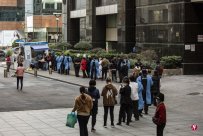(Australia / Beijing Comprehensive News) China Confucius Institute has successively settled in the "Belt and Road" countries along the “Belt and Road” when the Chinese Confucius Institute has been closed in various countries.Expert analysis said that this will help China expand its geographical economic influence and gain more political space.
According to the Voice of the United States, the Luban Gongfang was launched by the Tianjin Municipal Government. The name is the well -known artisan "Luban" in Chinese history, and provides vocational education to residents in countries along the Belt and Road.
Similar to the Confucius Institute, the Luban Workshop will find partners in the landlord country to jointly discuss which technologies need to be required for the local “Belt and Road” construction.After graduation, students can invest in employment in the local “Belt and Road”.
For example, the Thai Luban Workshop cooperates with China to invest a local high -speed railway plan of US $ 7 billion (about S $ 9.9 billion) to offer courses such as high -speed rail maintenance technology and railway automatic control;The Yaji Railway offers railway operation management courses.Siyabba and Gibi, the capital of Africa Ethiopia, are connected to the capital of Africa Ethiopia.
Report quoting Dirk Van Der Kley, a researcher at the National College of Global Management of the Australian University of Australia, the Luban Workers' Workshop can help enhance the attractiveness of Chinese capital construction and make China the preferred partner of the landlord, which may also leadChina has technology dependence, which also provides China with larger political operation space.
According to Xinhua News Agency in early October, since the first Luban workshop in 2016 was established in Thailand, it has now established 25 countries in Egypt, Ethiopia, India, Pakistan, Thailand, Portugal and Central Asia, and set up 25Luban Workshop.


